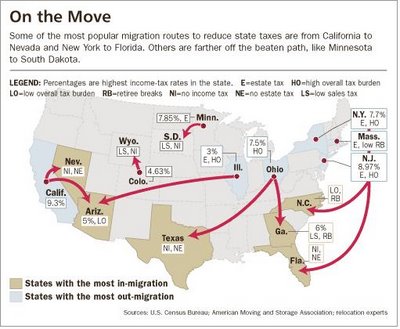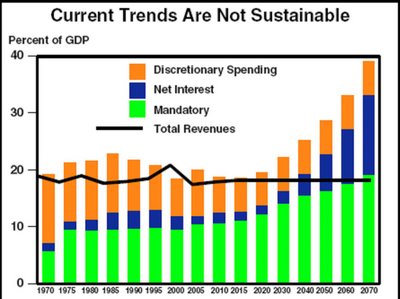
(My sentiments, exactly.)
And cell-phone users do die . . . but they take others with them:
Study: Distractions Cause Most Car Crashes
By KEN THOMAS, Associated Press Writer
BLACKSBURG, Va. - Those sleep-deprived, multitasking drivers — clutching cell phones, fiddling with their radios or applying lipstick — apparently are involved in an awful lot of crashes.
Distracted drivers were involved in nearly eight out of 10 collisions or near-crashes, says a study released Thursday by the government. . . .
"We see people on the roadways talking on the phone, checking their stocks, checking scores, fussing with their MP3 players, reading e-mails, all while driving 40, 50, 60, 70 miles per hour and sometimes even faster," said Jacqueline Glassman, acting administrator of the government's highway safety agency.
A driver's reaching for a moving object increased the risk of a crash or potential collision by nine times, according to researchers at the National Highway Traffic Safety Administration and the Virginia Tech Transportation Institute.
They found that the risk of a crash increases almost threefold when a driver is dialing a cell phone. . . .[Emphasis added.]
Researchers said the report showed the first links between crash risks and a driver's activities, from eating and talking to receiving e-mail.
"All of these activities are much more dangerous than we thought before," said Dr. Charlie Klauer, a senior research associate at the institute. Data from police reports had estimated that driver inattention was a factor in about 25 percent of crashes.
Some safety organizations said the study was part of a growing body of research and worried it might lead to reactionary laws.
"I urge legislators not to interpret these results as a need for new legislative initiatives. It is simply not good public policy to pass laws addressing every type of driver behavior," said Lt. Col. Jim Champagne, chairman of the Governors Highway Safety Association. . . . [Why not? Pray tell.]
Assessing cell phone use, the researchers said the number of crashes or near-crashes linked to dialing the phones was nearly identical to those tied to talking or listening on the phone.
Connecticut, New York, New Jersey and the District of Columbia have laws that prohibit people from talking on handheld cell phones while driving.
A government report last year found that about 10 percent of drivers are using cell phones. . . .
Also Thursday, a preliminary report from the safety agency said the highway death rate rose slightly in 2005 after falling for two years. The government said 43,200 people died on the road, compared with 42,636 in 2004.
A question for hard-core libertarians: Should there be strictly enforced laws (with harsh penalties) against talking on a cell phone while driving? I say "yes." If you disagree, tell me why. And don't waste words on a diatribe against the existence of the state. Start with reality, and take it from there.
UPDATE (5:10 pm): The Gonzman offers some good points:
[T]he laws of consequence should apply. I’m against seat belt laws, but for insurance companies declining to pay for your injuries if you refuse to wear one, per their contract with you. Same thing with motorcycle helmets.
Cell Phones? The consequences are predictable. And cell phone LUDS are easy to check. So, if you have an accident while talking on one, it should be a rebuttable presumption the accident is your fault, and further, if injury or death results, you should be subject to criminal charges.
I used to regard it as similar to drunk driving, but there is a distinction that my thinking has led me to over the years. A drunk is always impaired; someone talking on a cell phone, or eating lunch, or changing the radio, or lighting a cigarette is merely distracted to a lesser or greater degree, depending on traffic and/or road conditions. There are ways to do these responsibly. . . .
Here's my reaction:
If cell-phone use is potentially as dangerous as drunk driving, why shouldn't a cop pull over a person he sees holding a cell phone to her ear (or reading a paper or doing her nails), just as he would (and should) pull over a person whose driving suggests drunkenness? That is, why not try to prevent the preventable when the opportunity arises? If the cops are going to be out there anyway (and it's probably a good thing that they are), they might as well do something preventive if they can.
I don't mean that cops should pull over drivers for failing to wear seatbelts or motorcycle helmets. The failure to wear a seatbelt or helmet doesn't have murderous externalities, unlike talking on a cell-phone or driving drunk.
I like the Gonzman's point about deterrence, but I wouldn't rely solely on it in cases where there are potentially murderous externalities. Let it be known that phone records will be checked and criminal charges will be filed if the driver was on a cell phone at the time of an accident. Let insurance companies write policies that do not cover the life, limb, and property of the person at fault. Such measures might deter a lot of yakkety-yak. But that's no reason not to haul drivers over when they insist on hands-on yakking while driving.
So, I would go for a combination of deterrence and preventive enforcement. But -- again -- I would apply preventive enforcement only where a police officer sees behavior that potentially risks the lives of other persons, as in the cases of drunk driving and having a hands-on cell-phone conversation.
We may be hearing more from the Gonzman. Stay tuned.
UPDATE 2 (6:20 pm):
I am not buying in to the nanny-state mentality that bans smoking in privately owned establishments, such as bars and clubs, for the ostensible purpose of preventing death and disease. The main excuse for such bans (the main reason is anti-smoking prudery) is that smoking endangers the health of non-smokers as well as smokers. Pardon me, but the last time I looked there were places other than bars where one could drink or hold down a job. No one is forcing non-smokers to socialize and work at places where smoking is allowed.
But for the vast majority of drivers there is no alternative to the use of public streets and highways. Relatively few persons can afford private jets and helicopters for commuting and shopping. And as far as I know there are no private, drunk-drivers-and-cell-phones-banned highways. Yes, there might be a market for those drunk-drivers-and-cell-phones-banned highways, but that's not the reality of here-and-now.
So, I can avoid the (remote) risk of death by second-hand smoke by avoiding places where people smoke. But I cannot avoid the (less-than-remote) risk of death at the hands of a drunk or cell-phone yakker. Therefore, I say, arrest the drunks, cell-phone users, nail-polishers, newspaper-readers, and others of their ilk on sight; slap them with heavy fines; add jail terms for repeat offenders; and penalize them even more harshly if they take life, cause injury, or inflict property damage.



